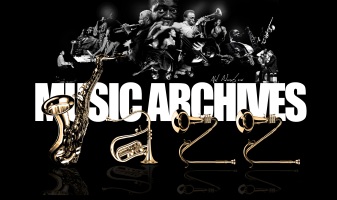
 |
The Black roots of Chinese pop music |
Post Reply 
|
| Author | |
snobb 
Forum Admin Group 

Site Admin Joined: 22 Dec 2010 Location: Vilnius Status: Offline Points: 28446 |
 Post Options Post Options
 Thanks(0) Thanks(0)
 Quote Quote  Reply Reply
 Topic: The Black roots of Chinese pop music Topic: The Black roots of Chinese pop musicPosted: 13 Jan 2021 at 10:47am |
|
From Louis Armstrong to Buck Clayton to Li Jinhui: The surprising connection between early American jazz and present-day Chinese pop.
 Louis Armstrong spent the last days of his life eating Chinese food and playing music on the front stoop with the neighborhood kids, who adored him. He lived with his wife Lucille and their two schnauzers, Trumpet and Trinket, in Corona, a neighborhood in Queens just across from the world’s largest Chinatown in Flushing. Armstrong had grown up among Chinese immigrants in New Orleans and adored Chinese food. While touring in Africa in 1961, he tracked down the only Chinese restaurant in Nairobi, Kenya — and kept the menu too. He also covered a few China-themed songs throughout his career, such as the 1931 recording of “Chinatown, My Chinatown,” a song commonly sung at the time by Chinese-American vaudevillians. In 1970, one year before his death, he wrote about visiting his favorite restaurant in Corona, the Dragon Seed, and not being able to eat his food before it got cold because the neighborhood kids would always spot him and plead for autographs. “So by the time I finished,” he wrote, “hmm my food were very cold.” No doubt, Armstrong would have been happy to hear that his music would ultimately revolutionize not only American music, but Chinese music as well. That’s because Armstrong had a profound influence on the jazz trumpet player Wilbur Dorsey “Buck” Clayton, a leading member of Count Basie’s Orchestra. In 1934, Clayton moved to Shanghai as the leader of the jazz group the Harlem Gentlemen. There, his music would in turn influence Lí Jǐnhuī 黎锦晖, the father of modern Chinese pop music, or C-pop. “It is true to say that Louis Armstrong was a significant influence on Buck Clayton,” says David Moser, the academic director at CET Chinese studies at Beijing Capital Normal University. “He was a huge influence on all trumpet players of that era. And it is true that Li Jinhui was strongly influenced by Clayton, but there’s no evidence that the two of them ever directly collaborated.” This, Moser notes, is despite a few mentions on the internet that would seem to indicate otherwise. In reality, they probably never did meet, but Clayton’s Harlem Gentlemen played Li Jinhui’s music for the dancers at the Canidrome Ballroom in Shanghai. In the 1920s and 1930s, jazz was pop music — brought to China by bands like Clayton but also records and Hollywood movies.In 1934, the notorious gangster Jack Riley started a fight with the band, causing them to lose their gig at the Canidrome Ballroom, writes Andrew Field, a Shanghai-based scholar and author of the book Shanghai’s Dancing World. The band eventually found work as Ladow’s Casanova, a lower-class ballroom frequented by sailors, soldiers, and middle-class Chinese where, Field told SupChina, Clayton was often forced to perform Chinese pop songs. Part of this exchange between jazz and early C-pop was made easier by the fact that many of the main figures moved in the same circles. In his autobiography Buck Clayton’s Jazz World, Clayton says he learned local Chinese pop tunes for his work at a lesser club. “Some of these songs would almost surely have been written by Li Jinhui,” says Andrew Jones, professor of Chinese literature and media studies at the University of California at Berkeley, since Li had such a dominant role in the early Chinese pop music scene. It was also at one of these nightclubs or dancehalls, possibly the Canidrome, where Li Jinhui likely heard Clayton perform, says Jones. But another thing that made the back-and-forth possible was that both sides spoke the same language. In the 1920s and 1930s, jazz was pop music — brought to China by bands like Clayton but also records and Hollywood movies. Chinese pop music adopted standard jazz forms such as 8 and 16 bar structures with chorus and verses, instrumentation such as string bass, strummed guitars, and horns, as well as dance rhythms such as fox trot, swing, and blues. Meanwhile, the tonality of jazz and blues meant that for Clayton, it was easy to pick up Chinese folk songs that used pentatonic scales. From here, Chinese music continued to adapt, evolving from Li to Jay Chou (周杰伦 Zhōu Jiélún), Jolin Tsai (蔡依林 Cài Yīlín), and the U.S. rapper Yudes. There are other stories of musical exchange between American jazz artists and C-pop musicians. For instance, there’s the theory by the late journalist and poet Nick Tosches that scat singing originally came from jazz musicians such as Louis Armstrong imitating the sound of Chinese that they heard in the streets around them. Or the more self-conscious adoption of East Asian forms in the 1960s, as in the music of John Coltrane or Pharaoh Sanders. But none were as influential as the tie between Clayton and Li. Sadly, after founding C-pop, Li was not celebrated as a hero. He was persecuted for having created an immoral genre and later killed during the Cultural Revolution. Clayton, fortunately, met with a better ending. After he returned home from China, he continued to travel and spend a lot of his time on the road, playing gigs. At the age of 40, he became a father, though he still traveled often and had precious little time to spend with his family. “But he was a devoted family man,” says his daughter, Candice Bryson, who is now 66 years old and lives in Florida with her family. “And when he did have time, he made up for it.” He also made music a central part of family life. “We went to a lot of shows together,” Bryson says, adding that in her home growing up, her father’s music was just a regular part of life. Clayton was a quiet man, she says, but when his friends came around, the house was full of laughter. Laughter and jazz. “I do remember he talked about China,” says Bryson. “I think he had a good time there. I have a lot of his music, and Illinois Jacquet — we listen to a lot of that around here too, same as my dad.” And, she says, “He liked Chinese food too.” from https://supchina.com |
|
 |
|
Post Reply 
|
|
|
Tweet
|
| Forum Jump | Forum Permissions  You cannot post new topics in this forum You cannot reply to topics in this forum You cannot delete your posts in this forum You cannot edit your posts in this forum You cannot create polls in this forum You cannot vote in polls in this forum |